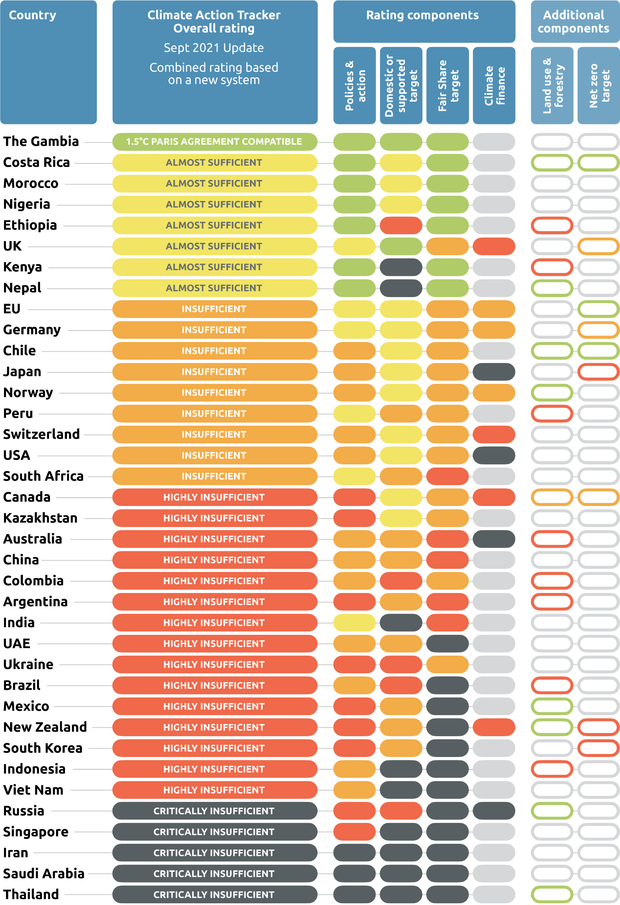"Nothing is moving": Only one country in the world has submitted plans that will mitigate climate change by 2030, watchdog finds
A recent report from the United Nations found that the world risks soon hitting 1.5°C of global warming in the 2030s, a threshold that would ignite "extreme events unprecedented in the observational record." Despite the dire warning, a new analysis has found that none of the world's major economic countries have sufficient plans to combat climate change.
The goal of the Paris Climate Agreement is to maintain that 1.5 threshold. But last month's report said that without "deep reductions in carbon dioxide and other greenhouse gas emissions," the world will surpass it within 80 years.
If dramatic reductions were made quickly, it would put the world closer to that goal; however, experts have said that such a scenario is unlikely. And Wednesday's analysis of 37 countries by watchdog organization Climate Action Tracker (CAT) seems to echo that assessment.
"While people are suffering from ever more severe and frequent impacts of climate change around the globe, and the IPCC has yet again clearly demonstrated the feasibility and urgency of climate change mitigation, action to reduce greenhouse gas emissions continues to lag behind what is needed – in practically all countries and sectors," the report says. "The momentum on updating 2030 targets for climate action has stalled since May, with no major emitters putting forward stronger climate targets, and the 2030 emissions gap has barely changed."
The majority of G20 countries, which includes 19 countries and the European Union and make up more than 80% of the world's GDP and 60% of the global population, have failed to met their obligations, the analysis found.
Only Gambia has a plan "compatible" with the Paris agreement, CAT said, and the United Kingdom is the only one of the G20 countries among those with "almost sufficient" plans. CAT determined its rankings based on countries' mitigation targets, policies and action, and climate action.
Two G20 countries had "critically insufficient" plans; nine had "highly insufficient" plans; and four, including the U.S., had "insufficient" plans. Three G20 countries -- France, Italy and Turkey -- were not included in the analysis, as CAT says they have not provided new submissions for their plans.
President Biden said in May at the Leaders Climate Summit that the U.S. will cut greenhouse gas emission by at least half from 2005 levels by 2030. Niklas Höhne, of NewClimate Institute, said that groups thought it seemed as though dialogue at the summit created "good momentum."
"But since then, there has been little to no improvement: nothing is moving," Höhne said in a statement. "Governments have now closed the gap by up to 15%, a minimal improvement since May. Anyone would think they have all the time in the world, when in fact the opposite is the case."
As part of the Paris Climate Agreement, participating countries are expected to create nationally determined contributions (NDCs) that would help widen the gap between the world hitting that 1.5°C threshold. Wednesday's analysis found that gap has only been narrowed by about 15%, according to the NDC updates countries have submitted so far.
Nearly 90 countries, as well as the EU, have submitted new updates, covering half of global greenhouse emissions, CAT said. Some countries have proposed new and ambitious targets, but have not formally submitted them. More than 70 countries, accounting for roughly 25% of the world's greenhouse gas emissions, have yet to submit any goals at all.
Australia, Brazil, Indonesia, Mexico, New Zealand, Russia, Singapore, Switzerland and Vietnam governments are "of particular concern," CAT said, as they "have failed to lift ambition at all." The watchdog says these countries have submitted either the same or even less ambitious goals for their 2030 targets than what they had proposed in 2015.
The group said that while the U.S., EU and Germany have significantly updated their targets and implemented new polices, "positive developments need to urgently be scaled up" by others. CAT said that "almost all developed countries" need to strengthen their targets as fast as possible and to support developing countries to do the same.
"The most important target date is 2030, by which time global emissions must be cut by 50%, and governments are nowhere near this," the group said. "We estimate that with current actions global emissions will be at roughly today's level in 2030, we would be emitting twice as much as required for the 1.5°C limit."




